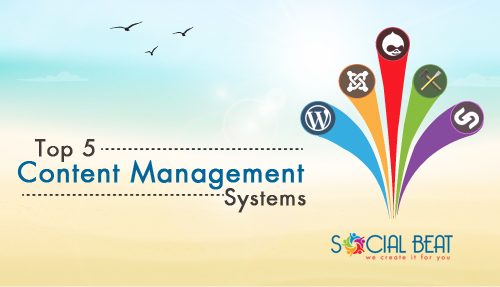If you are planning to build a website in the near future, you might be confused on which platform to use. While there is a whole bunch of content management systems (CMS) in the market, you might want to use the platform that allows you to do it without worrying too much about the technical aspects like coding.
What is a Content Management System?
In simple terms, a Content Management System is a software tool that allows you to create, edit, publish and manage web content. The main objective of a CMS is to provide an intuitive interface to manage your content on the web.
There are many good content management systems like WordPress and Drupal; and they are all fantastic. But choosing one among them can be difficult because you do not know if the website is suited for the needs of your website. The server can sometimes be a challenge in having an effective CMS and we usually recommend the Linux based servers being provided by Bluehost or Amazon Web Services.
This article shall make you aware of the different aspects of the Top-5 Content Management Systems in the market and help you make an informed decision.
-
WordPress
Homepage: www.wordpress.org
One of the world’s most popular content management systems, WordPress started out as a blogging platform, but has grown and advanced significantly over the years. Based on PHP & MySQL, WordPress is used by almost 23% of the top 10 million websites around the world. Examples of WordPress websites are Social Beat, ithought, etc.
Advantages:
- It’s free and the easy installation offered does not require complex technical know how to maintain the website
- User friendly dashboard for managing content
- Multi-user and multi-blogging support
- Wide number of plug-ins and themes, both paid and unpaid, for customizing your website
- A large developer community and plenty of tutorials and documentation available for support
- Easy linkage to your email platforms such as Mailchimp to allow you to keep in touch with customers
Disadvantages:
- Standard installation can have security issues and is vulnerable to attacks. Needs to be addressed with continuous updates and monitoring of the website
-
Drupal
Homepage: www.drupal.org
Drupal is the 2nd most popular PHP-based content management system. It’s a powerful, developer friendly platform that can be easily used for building complex websites. In the latest releases, database management modules have been added that allow managing SQL operations without writing SQL queries. Many big companies like General Electric, Time Warner and Sony Music, are using Drupal.
Advantages:
- Less resource intensive than WordPress
- Technically advanced in comparison to peers like WordPress and Joomla
- Very flexible; has the feature to even edit the root files of the program
- Easily customizable with numerous plug-ins & 6000+ modules available for easy extension of functionality
- Powerful taxonomy & ability to tag and organize complex content
- Faster load and response time
- Powerful use cases available
Disadvantages:
- Basic knowledge of HTML, PHP and other common programming languages is required
- Theming system is complex along with a lack of high-quality plug-ins
- Site complexity beyond a simple website or a blog requires technical know-how to keep it running
-
Joomla
Homepage: www.joomla.org
Joomla is quite often, an intermediate choice between WordPress and Drupal, having the power of a Drupal website and at the same time managing the user-friendly nature of a WordPress website. Joomla has a lot of plug-ins and themes available to choose from, so you can easily customize your website based on your requirements. It’s suitable for creating back-end networks for a wide range of purposes like inventory control and reservation systems to online commerce websites.
Advantages:
- Faster and easier to setup an online store; has more native support online commerce
- A great platform to create social networks
- Long history of development and an active developer community
- Tons of plugins and add-on tools available
- 7000+ plus extensions and an extensive help portal
Disadvantages:
- Not easy for beginners
- Modularity & expendability puts greater demand on server parameters
- Lack of high-quality themes when compared to WordPress
-
SilverStripe
Website: www.silverstripe.org
SilverStripe is another open source content management system, best serving the needs of developers slightly comfortable with coding. Built on an object-oriented framework called Sapphire, it has multiple platform modules allowing it to support a content formats like blogs as well as forums / communities. SilverStripe code is bound together through independent frameworks; thus providing it the capability to support any CSS Style Sheets and HTML codes.
Advantages:
- Open standards for development leading to high development versatility
- Easy back-end functions
- Powerful content authoring tool with ability to publish/unpublish content on specific dates
- Differential permission levels for different parts of the site to manage your own editor/author network
- Strong developer community SilverStripe LTD to fall back for technical support
Disadvantages:
- Less intuitive back-end in comparison to peers like WordPress
- Less than 200 extension modules and not many high-quality themes available
- Lack of documentation support
-
TextPattern
Website: www.textpattern.com
A highly flexible content management system, TextPattern is a free, PHP based CMS that is more often skipped when looking at the top CMSs for websites. It leverages Textile to quickly convert plain text to XHTML, making it user-friendly for beginners.
Advantages:
- User-friendly for non-technical users
- Suitable for websites of varied sizes
- Great documentation; complete manual available online
Disadvantages:
- Minimal variety of themes (~120 front end themes available)
- Fewer plugins
- Small developer community


